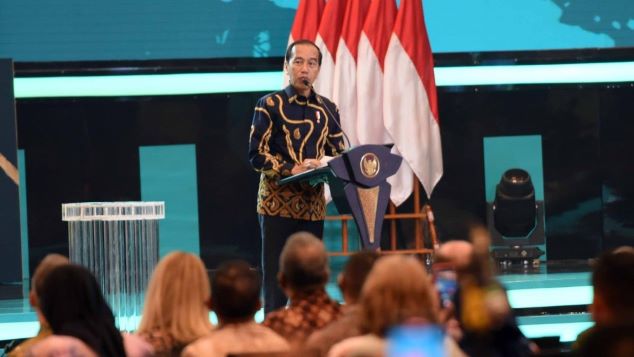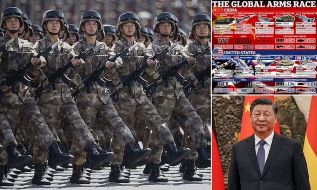Rakerkesnas 2024, Presiden Jokowi: Kesehatan Kunci Wujudkan Visi Indonesia Maju
President Jokowi: Health is the Key to Realizing the Vision of an Advanced Indonesia
Editor : Ismail Gani
Translator : Novita Cahyadi

Tangerang, Banten [B2B] - Presiden RI Joko Widodo [Jokowi] menekankan bahwa sektor kesehatan merupakan komponen fundamental dalam mewujudkan visi Indonesia maju tahun 2045
Hal ini disampaikan Jokowi saat membuka Rapat Kerja Kesehatan Nasional [Rakerkesnas] 2024, di Indonesia Convention and Exhibition (ICE) BSD, Tangerang, Banten, Rabu [24/4].
"Kesehatan menjadi hal yang sangat penting, kunci, sangat fundamental. Dan, Bapak-Ibu semuanya yang hadir pada pagi hari ini memiliki peran yang sangat signifikan untuk mencapai sebuah masyarakat yang sehat bagi Indonesia maju, bagi Indonesia emas, dan peluang itu jangan dibiarkan hilang sia-sia," ujar Jokowi.
Pada tahun 2030 Indonesia akan memiliki bonus demografi dengan 68 persen penduduknya berada pada usia produktif. Dalam mengoptimalkan bonus demografi tersebut, kata Presiden, Indonesia dihadapkan pada sejumlah persoalan, salah satunya adalah stunting.
"Stunting sudah turun dari 10 tahun yang lalu 37,6 turun kemarin akhir tahun di 21,5 persen, sudah turun hampir separuh, tapi harusnya kita mencapai paling tidak tahun ini 14 persen," ujar Jokowi.
Selain itu, Jokowi juga menyoroti tantangan besar dalam mengatasi penyakit tidak menular seperti strok, jantung, dan kanker yang menjadi penyebab kematian utama di Indonesia.
"Inilah pekerjaan besar kita. Tetapi kita tahu puskesmas sekarang ini sudah dikirim alat-alat lab, USG, EKG untuk mengatasi sedini mungkin hal-hal yang tadi saya sampaikan," ujarnya.
Selanjutnya, Jokowi juga menyoroti infrastruktur kesehatan yang belum memadai di beberapa daerah, termasuk fasilitas rumah sakit dan ketersediaan alat medis yang canggih. Selain itu, kekurangan dokter juga masih menjadi pekerjaan rumah berat di sektor kesehatan yang Jokowi tekankan untuk terus dikejar.
"Memang problem terbesar kita adalah dokter yang kurang, dokter spesialis yang kurang. Ini persoalan besar kita. Dan supaya Bapak Ibu tahu bahwa rasio dokter kita masih 0,47, ranking-nya 147 dunia. Ranking-nya seperti itu, kita harus tahu. Ini yang akan kita kejar," ujarnya.
Jokowi meminta agar semua rencana pembangunan di bidang kesehatan harus terintegrasi dan sinergi, baik di tingkat pusat maupun daerah. Rencana induk di bidang kesehatan, yang dijanjikan akan selesai pada Agustus oleh Menteri Kesehatan, diharapkan menjadi pedoman nasional yang akan mengarahkan Indonesia ke arah kemajuan yang signifikan di sektor kesehatan.
"Jangan sampai pusat ke utara daerah ke selatan. Semuanya harus inline, harus satu garis lurus mana yang akan dikerjakan," tegasnya.
Terakhir, Jokowi juga menyoroti perlunya penguatan industri kesehatan dalam negeri. Menurutnya, Indonesia masih kehilangan sekitar Rp180 triliun per tahun karena banyak warganya memilih berobat ke luar negeri. Selain itu, ketergantungan yang tinggi terhadap impor bahan baku farmasi dan alat kesehatan juga menjadi perhatian.
"Kemudian 90 persen bahan produksi farmasi itu masih impor. 90 persen masih impor. Kemudian 52 persen alkes kita juga masih dominasi impor," ungkap Jokowi, menegaskan perlunya Indonesia memproduksi lebih banyak komponen medis secara lokal.
Tangerang, Banten [B2B] - Indonesian President Joko Widodo (Jokowi) emphasized that the health sector is a fundamental component in realizing the vision of a developed Indonesia in 2045
Jokowi conveyed this when opening the 2024 National Health Working Meeting (Rakerkesnas), at the Indonesia Convention and Exhibition (ICE) BSD, Tangerang, Banten, Wednesday (24/4)
"Health is very important, key, very fundamental. And, all of you ladies and gentlemen who are present this morning have a very significant role in achieving a healthy society for a developed Indonesia, for a golden Indonesia, and don´t let that opportunity be lost. in vain," said Jokowi.
In 2030 Indonesia will have a demographic bonus with 68 percent of its population being of productive age. In optimizing the demographic bonus, said the President, Indonesia is faced with a number of problems, one of which is stunting.
"Stunting has fallen from 10 years ago to 37.6, down yesterday at the end of the year at 21.5 percent, it has fallen by almost half, but we should reach at least 14 percent this year," said Jokowi.
Apart from that, Jokowi also highlighted the big challenges in overcoming non-communicable diseases such as stroke, heart disease and cancer which are the main causes of death in Indonesia.
"This is our big job. But we know that the puskesmas has now been sent lab equipment, ultrasound and EKG to deal with the things I mentioned earlier as early as possible," he said.
Furthermore, Jokowi also highlighted the inadequate health infrastructure in several areas, including hospital facilities and the availability of sophisticated medical equipment. Apart from that, the shortage of doctors is still a tough task in the health sector which Jokowi emphasized to continue to pursue.
"Indeed, our biggest problem is not enough doctors, not enough specialist doctors. This is our big problem. And so that ladies and gentlemen know that our doctor ratio is still 0.47, the ranking is 147th in the world. The ranking is like that, we have to know. "This is what we will pursue," he said.
Jokowi requested that all development plans in the health sector be integrated and synergistic, both at the central and regional levels. The master plan in the health sector, which was promised to be completed in August by the Minister of Health, is expected to become a national guideline that will direct Indonesia towards significant progress in the health sector.
"Don´t let the center go to the north, the area goes to the south. Everything has to be inline, it has to be a straight line which will be done," he stressed.
Finally, Jokowi also highlighted the need to strengthen the domestic health industry. According to him, Indonesia still loses around IDR 180 trillion per year because many of its citizens choose to seek treatment abroad. Apart from that, high dependence on imports of pharmaceutical raw materials and medical devices is also a concern.
"Then 90 percent of pharmaceutical production materials are still imported. 90 percent are still imported. Then 52 percent of our medical equipment is still dominated by imports," said Jokowi, emphasizing the need for Indonesia to produce more medical components locally.















